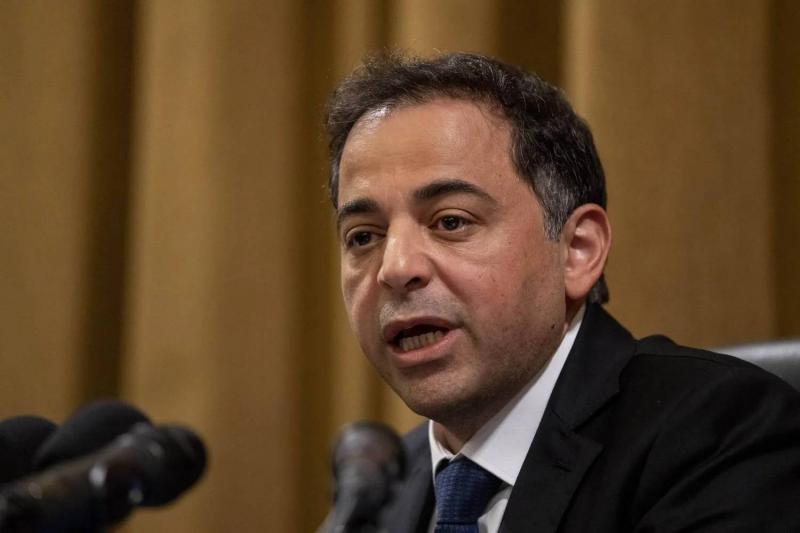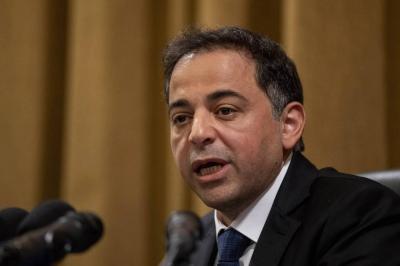Prime Minister Najib Mikati, represented by Minister of Finance Dr. Youssef Khalil, sponsored the opening ceremony of the "Second Lebanese Real Estate Forum" today at the "Vinicia" hotel in Beirut, under the title "The Real Estate and Housing Sector in Lebanon: Between Stagnation and Revival," at the invitation of the Real Estate Syndicate of Lebanon, where several agreements were signed with various institutions. Acting Governor of the Central Bank, Wassim Mansouri, said, "The real estate market in Lebanon is one of the most active and vital markets in the region, and it is a significant source of income for many individuals and companies. This sector contributes to attracting foreign and local investments, enhances asset value, and creates an environment conducive to economic growth. By providing job opportunities in construction and development or related industries such as cement, steel, and timber, the real estate sector in Lebanon is a driver of economic and social development, significantly supporting the national economy and achieving sustainable development in the country."
He added, "According to recent reports and statistics, the real estate sector represents about 15% of Lebanon's GDP, while the latest statistics from the Central Bank indicate that the total volume of cement delivered in 2023, which is a current activity indicator for the construction sector, increased by about 11% compared to 2022. However, the area of licensed construction projects in 2023, which is an indicator of the sector's future activity, decreased by 43% compared to 2022." He continued, "However, the real estate sector in Lebanon has faced serious challenges for years due to successive crises that have greatly affected the sector's ability to grow and stabilize. The decline in citizens' purchasing power, the decrease in investments, and the rising construction costs have led to a slowdown and regression in real estate activity and a drop in prices. Additionally, the long-standing reduction in liquidity in the region before the outbreak of the crises negatively impacted the real estate situation in the entire region, not just in Lebanon."
He noted that, "Before the crisis of October 2019, housing loans constituted about 19% of total bank lending, and the housing sector accounted for 60% of total banking incentives to support various economic sectors between 2013 and 2019. Currently, the halt in lending due to the Lebanese banking crisis is a significant obstacle to reviving this sector." He explained that "this halt has led to a shortage of liquidity available to investors and developers, slowing down the pace of real estate projects and freezing many of them. This situation requires finding effective and rapid solutions to reactivate real estate financing."
He stated, "In reality, the Lebanese economy has been facing exceptional and pressing circumstances for more than four years due to the multidimensional crisis it is undergoing, coupled with ongoing pressures and difficulties resulting from the Syrian crisis and its risks, particularly the influx of displaced persons, making Lebanon the country housing the largest number of displaced persons in the world relative to its population. Additionally, the geopolitical developments, especially the war on Gaza and its implications for Lebanon, cannot be overlooked."
Mansouri explained that "this reality is reflected in the sharp decline in main economic indicators in the fields of foreign trade, tourism, investment, consumption, and government spending since the end of 2019, coinciding with unprecedented price increases. Since the onset of the crisis until today, the economy has contracted from about $55 billion annually to less than $20 billion, and the Lebanese pound has lost 98% of its value, with an average inflation rate of 3,221% in 2023. As for the budget, it has fallen from $17 billion to $3.2 billion."
He continued, "Despite these negative indicators, we see that the time has come for the banking sector to resume lending, as it is impossible to restart the economic wheel without the return of lending to the private sector. The Lebanese banking sector is an essential and vital part of the Lebanese economy and is the primary engine of the growth process. Banks and financial institutions generally provide the ideal environment to attract funds and investments to direct them toward projects and economic activities."
He emphasized that "the role of the central bank is to ensure monetary stability, which in turn ensures social stability, as stipulated in the Monetary and Credit Law." He added, "To ensure this stability, we have worked, in cooperation with the Lebanese government and the Ministry of Finance, to control the cash in circulation in pounds, reducing the monetary mass from 82 trillion pounds at the beginning of 2023 to 60 trillion pounds currently, and we have prevented currency manipulation, with the central bank deciding not to touch the mandatory reserve and to stop funding the state in pounds and dollars."
He continued, "Foreign reserves at the central bank recorded a surplus of more than $1.3 billion since August 2023, reaching $9.929 billion, against a monetary mass of less than $700 million." He added, "However, the monetary stability currently achieved due to controlling the cash mass in pounds, and not injecting dollars except through the state, and creating a balance between the dollarized economy and the local currency economy is not sufficient to build the economy."
He said that "it is necessary to immediately work on: completing the reform laws, organizing state finances, resolving the crisis of depositors' funds, restoring confidence in banks, and returning liquidity to banks. This will allow the Central Bank, as the regulator of the banking sector, to tighten regulations more to curb the cash economy and keep Lebanon integrated within the global financial system. As you know, Lebanon, like neighboring countries, is under increased scrutiny from the international community."
Mansouri added, "We must not overlook the state of mistrust caused by successive crises in Lebanon, which has diverted economic activity outside the banking system, leading to it becoming entirely cash-based."
For his part, Minister of Finance Youssef Khalil delivered a speech on behalf of President Mikati, saying, "It is an honor for me to represent the Prime Minister at your conference, which is rich in discussions and topics that present many challenges at this very moment, namely the real estate and housing sector in Lebanon between stagnation and revival. As you know, the real estate sector in Lebanon is going through a period of stagnation due to the economic and financial crisis that has plagued the country for years. This crisis has significantly affected citizens' purchasing power and led to a decline in the demand for properties. Additionally, the significant fluctuations in exchange rates and the loss of confidence in the financial system have complicated the situation further. But what should we do as a government alongside the private sector’s efforts?"
He added, "We, as a government, fully recognize the importance of the real estate sector as a fundamental pillar of the national economy and a primary source of investment. Therefore, we have taken several strategic steps aimed at activating and revitalizing this sector. Among these steps: efforts will soon be made to unify property assessments through the formation of joint committees from the Ministry of Finance and relevant bodies to unify property valuations. This unification aims to provide fair and standardized assessments of properties, helping create a transparent environment and enhancing trust between investors and buyers. Unified assessments reduce price disparities and contribute to the stability of the real estate market."
He continued, "As a government, we are committed to completing the processes of defining and liberating all uncompleted Lebanese lands to date. A draft law has also been prepared to link notaries with land registry offices and relevant tax departments, facilitating the registration process and guaranteeing the rights of contract parties."
He said, "This system facilitates and accelerates the property registration process, reducing bureaucracy, making procedures smoother and faster. The window created by this process will be a single one that allows citizens and investors to conduct all property transactions in one place, saving time and effort and enhancing operational efficiency."
He added, "Through these measures, we aim to stimulate growth in the real estate sector and attract more investments, and we also seek to improve the regulatory and legal environment to enhance confidence in the real estate market." He concluded, "We want to emphasize that we are committed to working hard and continuously to achieve these goals, and we are working towards building a better future for the real estate sector and the Lebanese economy as a whole."




